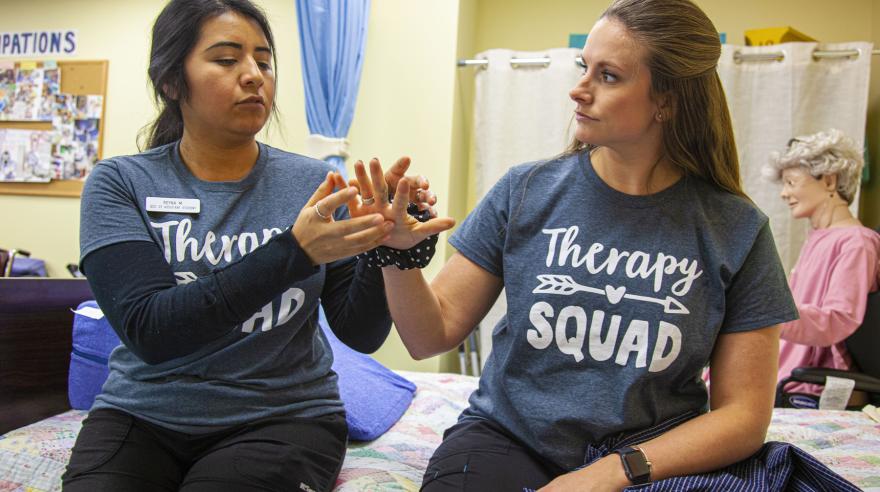Program Goals:
The Occupational Therapy Assistant associate degree program prepares students as generalist with a broad exposure to delivery models and systems for entry-level employment as a Certified Occupational Therapy Assistant (COTA). The Certified Occupational Therapy Assistant practices under the supervision of a Registered Occupational Therapist (OTR) as a member of the interdisciplinary healthcare team. Program graduates are eligible to apply for certification by examination from the National Board for Certification in Occupational Therapy (NBCOT). Upon successful completion of the examination, the graduate is eligible to apply for state licensure, required for practice.
Student Learning Outcomes:
Upon completion of the program, graduates will be able to:
- Demonstrate client-centered care by recognizing and understanding issues related to diversity in an individual’s perception of health, illness, and disability.
- Demonstrate knowledge of service delivery models and systems used in settings where occupational therapy is currently practiced and emerging practice areas.
- Achieve entry-level competence for practice through a combination of didactic and fieldwork education.
- Define and demonstrate knowledge of theory as it applies to practice.
- Articulate and apply occupational therapy principles and intervention tools to achieve expected outcomes as related to occupation.
- Articulate and apply therapeutic use of occupations with persons, groups, and populations for the purpose of facilitating performance and participation in activities, occupations, and roles and situations in home, school, workplace, community, and other settings, as informed by the Occupational Therapy Practice Framework.
- Apply evidence-based occupational therapy interventions to address the physical, cognitive, functional cognitive, psychosocial, sensory, and other aspects of performance in a variety of contexts and environments to support engagement in everyday life activities that affect health, well-being, and quality of life, as informed by the Occupational Therapy Practice Framework.
- Articulate the significance of life-long learning to keep current with evidence-based professional practice.
- Uphold the ethical standards, values, and attitudes of the occupational therapy profession.
- Recognize and articulate the distinct roles and responsibilities of the occupational therapist and the occupational therapy assistant in the supervisory process for service delivery.
- Demonstrate preparation and skills for effective collaboration with occupational therapists in service delivery.
- Communicate effectively, orally and in writing, and work interprofessionally with all who provide services and programs for persons, groups, and populations.
- Advocate as a professional for access to occupational therapy services offered and for the recipients of those services.
- Demonstrate active involvement in professional development, leadership, and advocacy.
Admissions Process:
Admissions inquiries should be directed to admissions@qcc.mass.edu. Prospective students may apply to the program of their choice by following the enrollment steps at www.QCC.edu/enrollment-steps.
Program Admissions Requirements:
Students should note that some first semester courses carry minimum prerequisites. Refer to the program grid.
- High School Diploma or GED/HiSET.
- Attendance at a Health Information Session or complete FYE 102 with a grade of “C” or higher.
- English: Placement into college level English.
- Biology: Minimum grade of “B” in high school biology or “C” or higher in any college level biology course (BIO 101 recommended). Required grade must be earned within two attempts of taking and completing the course. Qualifying biology course must be taken within five years of application.
- TEAS Admission Requirement: Applicants must have taken the TEAS within the last five years of applying to the program.
- A qualifying composite score must be achieved in no more than three attempts within a rolling three-year period (scores from multiple tests cannot be combined).
- To meet the TEAS admission requirement, applicants must achieve one of the following:
The TEAS admission requirement may be waived if the applicant has an advanced degree (i.e., BS, BA, MS).
OR
A composite TEAS score of 60% or higher
OR
- A composite TEAS score between 56% and 59%, with the following minimum GPA requirements (see table below):
TEAS Score | Overall QCC College Biology GPA (4 credit minimum) | Overall QCC College GPA (15 credit minimum) |
59 | 2.7 or higher | 2.7 or higher |
58 | 2.8 or higher | 2.8 or higher |
57 | 2.9 or higher | 2.9 or higher |
56 | 3.0 or higher | 3.0 or higher |
Program Retention / Progression Requirements:
To be eligible to continue in the program, students must:
- Achieve a grade of “C” or higher in all program courses designated by OTA.
- Achieve a grade of “C” or higher in BIO 111, BIO 112, ENG 101, and ENG 102.
- Maintain documentation of current Healthcare Provider Level BLS/CPR Certification.
- Maintain documentation of immunization currency and satisfactory health status.
- Maintain documentation of annual TB testing.
- Maintain documentation of health insurance.
- Maintain an active membership in the American Occupational Therapy Association (AOTA) for Semesters 2, 3, and 4.
- Complete both OTA 241 and OTA 242 within 18 months of the OTA didactic coursework.
Program Readmission Requirements:
There is a one-time readmission policy for the program.
- Readmission is not guaranteed and is always based upon space availability. See the QCC Student Handbook and Program Student Handbook for the complete readmission procedure.
- Students who did not earn a grade of “C” or higher in OTA 101 and/or OTA 131 need to re-apply to the program through the Admissions Office. Students should contact the Program Coordinator as soon as they receive the notification of being placed on the waitlist (by April 15) to discuss readmission.
- Students who did not earn a grade of “C” or higher in any other OTA course should contact the Program Coordinator to discuss readmission by October 15 for Spring courses or by April 15 for Fall courses.
- Students who have been dismissed or administratively withdrawn from a program within the School of Healthcare at Quinsigamond Community College for reasons of “clinically unsafe practice/behavior” or who violate the College’s Student Code of Conduct or Policy on Affirmative Action are not eligible for admission/readmission to any Healthcare program.
Program Graduation Requirements:
Students must satisfy all course and program requirements, including regulations related to attendance and conduct, in order to be eligible for graduation.
CORI, SORI, Finger Printing & Drug Testing:
Criminal Offender Record Information (CORI), Sex Offender Registry Information (SORI), and National Background checks are required in the program, annually or every semester. Fingerprinting and drug testing are required. Fingerprinting and drug testing results must meet clinical requirements. An issue with CORI/SORI, National Background, fingerprinting and/or drug testing could prevent a student from participating in a clinical/field rotation, which could result in dismissal from the program.
- A felony conviction could prevent a student from participating in (eligibility) certification and credentialing exams post-graduation.
Additional Cost:
See the Program Fees page.
- Students should anticipate additional expenses for textbooks, American Occupational Therapy Association (AOTA) membership, transportation and parking fees at field placement sites, and National Board for Certification in Occupational Therapy (NBCOT) exam and licensing applications.
Technical Performance Standards:
See the Technical Performance Standards page. (Note: Not all programs have technical performance standards).
- The QCC Occupational Therapy Assistant program is deeply committed to diversity and fostering an inclusive environment that represents the diverse population of healthcare professionals. We value the uniqueness and potential of every learner and strive to create a culture of respect and equality, welcoming all students, including individuals with disabilities. We encourage students with disabilities to disclose their needs and seek accommodations to fully engage in our program. All disability-related conversations and requests are handled through a confidential process to protect the privacy of our students. After reviewing the Technical Performance Standards, students who have questions about accommodations should contact QCC Student Accessibility Services as soon as possible. Given the complexities of clinical-based programs, additional time may be needed to effectively implement accommodations.
- For more information, contact QCC Student Accessibility Services:
Credit for Prior Learning:
Credit for Prior Learning (CPL) allows students to use skills they already have towards a college degree or certificate. Work, life, volunteer and military experience may be translated into credit, allowing students to take fewer classes and earn their degree faster. CPL eliminates redundancies for students who have already earned credentials or mastered skills required for their program of study. Email experience@qcc.mass.edu for more information and eligibility.
Career Outlook:
Please consult the Massachusetts Career Information System at https://masscis.intocareers.org/ or the Occupational Outlook Handbook at www.bls.gov/ooh/ for specific occupational information. The CIP code for this program is 51.0803.
Transfer Articulations & Opportunities:
Prospective students may learn more about transfer articulation agreements at www.QCC.edu/agreements. More information regarding transfer opportunities is available at www.QCC.edu/transfer.


